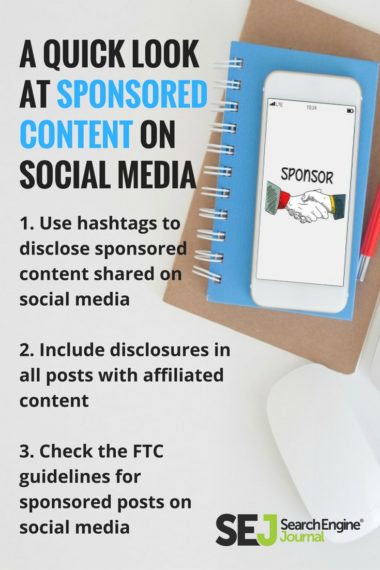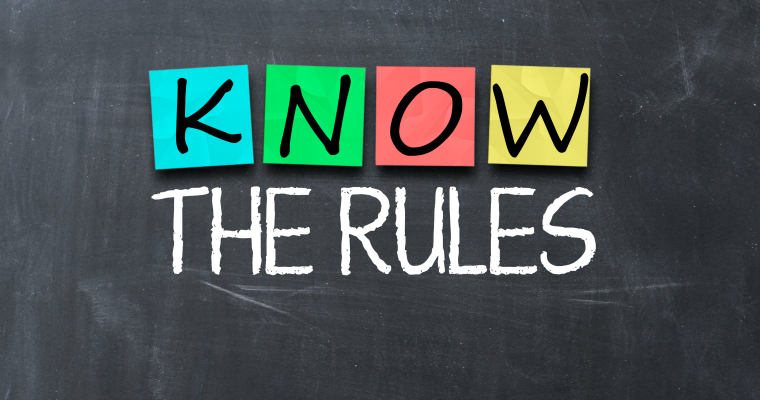Does your favorite user on Instagram really like her new noise canceling headphones or is she sharing sponsored content?
With the increasing prevalence of affiliate marketing on social media, it has become more and more difficult to discern what products and services influencers are genuinely excited about and which they are just being paid to promote.
Enter the Federal Trade Commission (FTC), the U.S. government agency responsible for overseeing advertising practices.
When providing us with their detailed guidelines for sponsored posts and native advertising on social media, they even offered us this creative narrative:
Suppose you meet someone who tells you about a great new product. She tells you it performs wonderfully and offers fantastic new features that nobody else has. Would that recommendation factor into your decision to buy the product? Probably.
Now suppose the person works for the company that sells the product – or has been paid by the company to tout the product. Would you want to know that when you’re evaluating the endorser’s glowing recommendation? You bet. That common-sense premise is at the heart of the Federal Trade Commission’s (FTC) Endorsement Guides.
It’s important to be aware of these guidelines in order to not only obey federal regulations but also to provide your audience with valuable and trustworthy recommendations.
What Is Sponsored Content on Social Media?
According to the FTC, you can consider something as sponsored content “if there’s a connection between an endorser and the marketer that consumers would not expect and it would affect how consumers evaluate the endorsement.”
Specifically, you should include a disclosure when:
- You’re being compensated to review or promote a product.
- You’ve received a free or discounted product/service in exchange for promotion/review.
- You’re being entered to win a significant prize.
If you’re a brand working with influencers, make sure that partners are aware of and abide by disclosure rules. Don’t end up like Warner Bros.

How Can I Make This Easy?
Hashtags
If you’re sharing sponsored content or native advertising on a social media platform that utilizes hashtags, this is a simple way to include your disclosure.
This is especially helpful on Twitter, where often disclosure goes out the window when users are trying to share as much information in their 140-character limit.
According to the FTC guidelines,
The words “Sponsored” and “Promotion” use only 9 characters. “Paid ad” only uses 7 characters. Starting a tweet with “Ad:” or “#ad” – which takes only 3 characters – would likely be effective.
Keep in mind, using the #sp or #spon doesn’t necessarily suffice because users may not easily understand the meaning behind them—and if you’re in the majority of people who place #ad at the end of their caption or tweet, you’re not complying with the standards. (However, using #ad or #sponsored at the beginning of a post and tagging the company’s handle will cover you.)
Wording
Even if you’re a regular reviewer and have a note on your website or in your bio stating that you often review products, it’s still important to include disclosures in all posts.
You don’t necessarily have to be speaking positively about a product to require the use of a disclosure. Even if you’re speaking negatively about a product, you still need to include your relationship to the company.
Otherwise:
- Use clear and unambiguous language.
- Tag the company on sites that provide the option.
- For sites where there is a “read more” feature, the disclosure should appear above this (or “above the fold”).
- If you’re including your disclosure in a video, be sure it’s shown long enough to be “noticed, read, and understood”.
What if I’m an Employee?
If you really love your company’s product or service and they allow sharing by employees, by all means, do!
However, it’s still required for you to include a disclosure, even if your role at the company is included in your profile.
Where Can I Find Out More?
The FTC has a great FAQ page outlining some of the most common questions asked. Check it out here.
As always, make your content valuable to your audience. Create honest reviews and endorsements when working with sponsored content (and all content, really).

Image Credits
Featured Image: Ai825/DepositPhotos.com
In-post Image: ymgerman/DepositPhotos.com





![AI Overviews: We Reverse-Engineered Them So You Don't Have To [+ What You Need To Do Next]](https://www.searchenginejournal.com/wp-content/uploads/2025/04/sidebar1x-455.png)